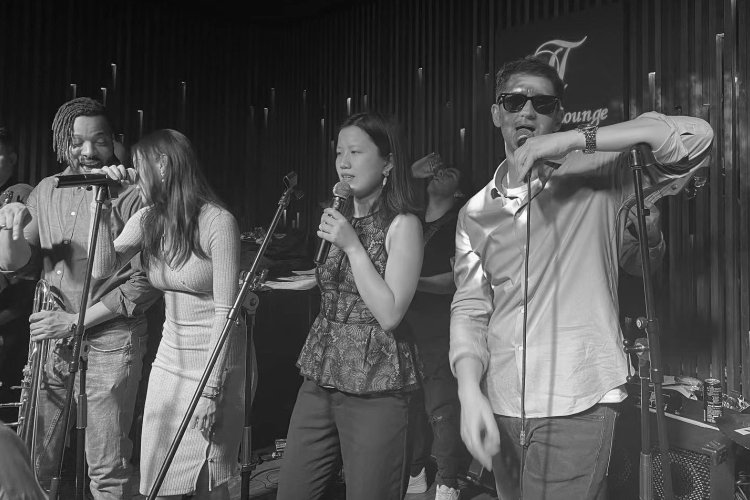Media Players: Alex Searson, City Weekend Nightlife Editor and Owner of Beijing Gig Guide
For our September Music Issue, we asked a selection of the city's music experts for their take on the current state of the 'scene' here in the capital. Now it's the turn of the city's media players. The figures that shape the city musically, their first hand insight provided some cause for optimism, and some sobering conclusions. Up next, Alex Searson, City Weekend Nightlife Editor and Owner of Beijing Gig Guide.
Describe your blog/website in less than 20 words.
Beijing Gig Guide is a simple event listings website that covers the local indie music scene in Beijing.
How long have you been writing about music?
I've been writing about music since I got to China in 2009. I had no experience with music writing previously, but I've kept blogs and been writing as a hobby for as long as I can remember.
Why do you find Chinese music so compelling to write about?
It's not Chinese music per se, but local bands. I was into local bands of all sorts in Sydney as well, and there's something wonderful about seeing bands grow and shape in front of your eyes. But in Beijing, there's the extra added bonus of seeing whole genres take root and grow. It doesn't always mean great bands – with growth comes growing pains – but every now and then a band comes along that makes it worth it.
How do you think independent Chinese music has progressed since you started your blog/website?
Some bands have grown up and gotten really big, with corporate sponsorship, and recently we saw the first metal bands on mainstream television. I think that sort of mass attention and appeal is a great step in the right direction for making musicianship and being in a band a more financially viable decision for kids.
What trends have you noticed in Chinese music recently?
The post-rock scene seems to be growing recently, with certainly a lot of support if not a lot of Beijing bands. There have been a couple of post-rock festivals organized at MAO Livehouse and Mako Livehouse, and though a lot of that genre tends to sound the same to me, it's interesting that a largely instrumental and experimental genre is getting popular. Also, some of the Scandinavian post-rock groups have gained huge Chinese followings – the pg.lost audience at Yugong Yishan this year was largely Chinese.
What's the best new act you've seen in the last 12 months?
My new favorite band – for anyone who hasn't read my website, blog or City Weekend lately – is Residence A. I saw them for the first time at a Wednesday night show at D-22 and nobody was up at the front. But as soon as they started, I dragged a friend down there with me. It's been a long time since I've felt this way about a band; I don't think I've had a band I've felt so strongly about in China yet.
What would you like to see for the future of Chinese music in five years time?
My hope is that some of the top of the underground bands get some more mainstream exposure, and I think that's a possibility. Mostly I'd like small shows to be better attended, and for more of the local Chinese population to get into the scene. There are still Chinese university-age kids out there who don't know who New Pants are, despite them having been around for fifteen years and their songs being in KTV machines. I hope that there will be more awareness and interest, but that might only happen when young people have more freedom to have different interests while going through school.
Why do you think it's difficult for Chinese acts to get international recognition?
The biggest problem that most indie Chinese bands have is not being able to market themselves. The best of them might put up a Douban with some songs and photos and maybe a video they find on Youku, but there's no concerted effort to publicize themselves or their shows. I don't think it's all humility or not wanting to show off – these bands are still made up of musicians with artistic temperaments and egos – but more of a resignation to the perceived (and oftentimes true) fact that being a musician isn't a worthwhile, or at least financially viable pursuit. Very few bands have merchandise of any kind, and while it might be expensive to get into a studio, there's plenty of ways to make extra money that bands just don't take the time or make the effort to do. Playing shows is great, but even non-musicians like me know that the best way for a band to make money is to sell merchandise. And I know I'm still talking locally, but if bands don't even think they can make some money being a local act, there's no way that attitude will get them overseas attention.
Click here to see the September issue of the Beijinger in full.
Photo: Sui
Related stories :
Comments
New comments are displayed first.Comments
![]() alexjsearson
Submitted by Guest on Wed, 10/10/2012 - 15:42 Permalink
alexjsearson
Submitted by Guest on Wed, 10/10/2012 - 15:42 Permalink
Re: Media Players: Alex Searson, City Weekend Nightlife ...
That's true for a certain crowd. The world music scene abroad has eaten up Hanggai, but I would argue a lot of that is because they've always been willing to market themselves, and have made the effort to do so. And a lot of the bigger indie bands here (Carsick Cars, Hedgehog, Re-TROS) have gone on tour with other bands, or even done their own tours in big markets like the U.S. and Australia. And while their successes overseas might just be a drop in the bucket in the big-business pop music scene, they've made good impressions. Not everyone gets to tour with Sonic Youth, Regurgitator or Gang of Four.
![]() Herbz
Submitted by Guest on Fri, 10/05/2012 - 17:19 Permalink
Herbz
Submitted by Guest on Fri, 10/05/2012 - 17:19 Permalink
Re: Media Players: Alex Searson, City Weekend Nightlife ...
Why do you think it's difficult for Chinese acts to get international recognition?
That was an easy one... very few people are willing to pay to stand for 90 minutes and listen to a language they can't speak a word of + Ethnic East Asians abroad are usually deeply into music that's non-Asian while also not being able to understand the lyrics. Your product has to be musically/melodically rock solid and compete in the territories you are targeting, not merely marketed as "a band from China".
Yours Faithfully
Principle castanet player in "The Inflatable Maos"
Validate your mobile phone number to post comments.






